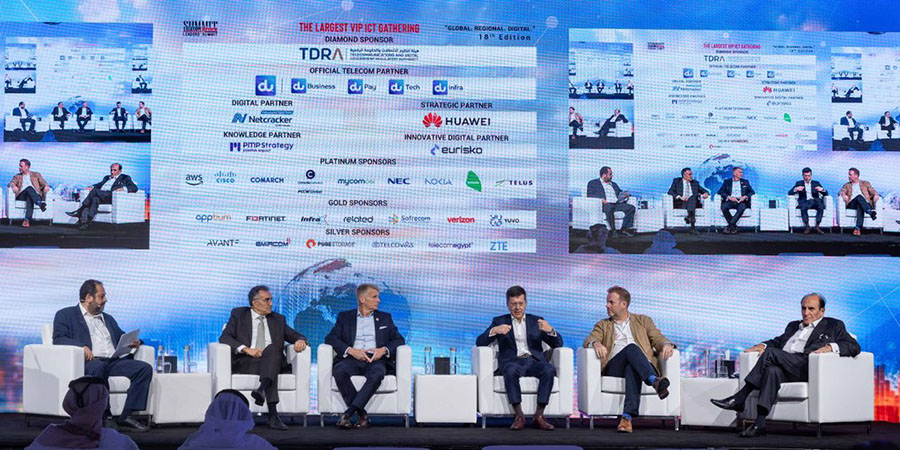During the 18th edition of the Telecom Review Leaders’ Summit, the Telecom Leaders' panel, held on the 11th of December, 2024, began with an engaging opening keynote delivered by Osman Sultan, Founder and Chairman, Fikra Tech, who set the stage for an in-depth discussion on the dynamic shifts and future opportunities within the telecom industry.
In his opening keynote, Sultan acknowledged the industry's shift from simple connectivity to profound transformation as mobile phones began changing everyday life. He reminisced about the "glorious era"—a time when telecom operators began expanding across geographies. Sultan pointed out that the rise of social media and OTT services forced the sector to play defense rather than offence.
He quoted, "They want to share our gain, they don't want to share our pain," reflecting the industry's struggles in adapting to new players.
A key theme of his speech was the telecom sector's failure to collaborate effectively. Sultan questioned why operators couldn't unite on new business models and collaborate more with third parties. "Why haven't we found a way to collaborate among ourselves?" he asked.
Looking to the future, Sultan emphasized the importance of collaboration and innovation, summarizing the emerging digital landscape as "everything sensing, everything connected, and everything smart." He also stressed that the real opportunity lies in building ecosystems, not just technology. "The technology can evolve faster, but the process is limited by the slowest component of the chain when you build an ecosystem."
Sultan concluded by urging the industry to embrace greater collaboration, noting that the future of telecom requires more unity and innovation to thrive in an increasingly connected world.
The Telecom Leaders’ Panel: Session Two
On the second day of the 18th edition of the Telecom Review Leaders’ Summit, some of the ICT industry’s most prominent leaders came together to discuss the challenges and opportunities shaping the telecommunications industry.
Moderated by Firas Mhedhebi, Managing Director, PMP Strategy Dubai, the Leaders’ panel included Osman Sultan, Founder & Chairman, Fikra Tech; Dr. Bilel Jamoussi, Deputy to the Director and Chief of Telecommunication Standardization Policy at the ITU; Mikhail Gerchuk, CEO, Telecom, Power International Holding; Johannes Hummer, Regional Head, Middle East, Africa, Central Asia, Caucasus, Vodafone; and Rob Beswick, Managing Director, Virgin Mobile UAE.
Fragmentation in Telecom
The panel opened with a discussion on the fragmentation and inefficiencies currently evident within the telecom industry. Hummer drew attention to the stark contrast between the U.S. and Europe, stating, "If you look at the United States today, you have three operators that own networks in a market of 340 million people. In the European Union, you have 480 million and 120 operators. So that, per definition, is already a problem."
He also highlighted the added complexity of state-owned telecom operators in many countries. "Most European countries, as well as here, have at least one operator owned by a government," Hummer pointed out.
Collaboration Over Integration
Another central theme was the importance of collaboration over integration. Gerchuk emphasized that collaboration offers more flexibility and can yield greater benefits.
"I like the word ‘collaboration’ as opposed to integration," he said, arguing that pooling resources across borders can lead to better procurement, traffic optimization, and research and development (R&D). He also stressed the value of cross-border talent development and knowledge-sharing to drive innovation and avoid redundant mistakes.
Acknowledging 5G’s presence, Beswick highlighted its transformative potential, particularly in industries like healthcare and education. "If you want to explore, or think and imagine, the use cases for utilizing 5G, they're endless," he said. While acknowledging that the full adoption of 5G is still in its early stages, Beswick emphasized the need for proactive telecom involvement and partnerships to unlock its potential. "It will come," he affirmed, recognizing that the transformative effects of 5G will be inevitable over time.
New Tech, New Concerns
Dr. Jamoussi brought attention to the growing importance of 6G and satellite connectivity, particularly low Earth orbit (LEO) satellites. He noted, "Today, we still have 2.6 billion people who are unconnected," highlighting the role LEO satellites play in bridging this gap.
Dr. Jamoussi emphasized that fiber-optic networks form the backbone of global connectivity, with LEO satellites helping to connect underserved regions.
Gerchuk discussed the significance of Fixed Wireless Access (FWA), particularly in regions with limited broadband infrastructure. "We truly believe in FWA as a killer application for 5G," he said, citing Kazakhstan as an example, where demand for FWA surged after the introduction of 5G. He believes FWA will play a major role in the future of telecom.
Cybersecurity is also emerging as a key concern, with Hummer stressing the need for greater collaboration among telecom operators to mitigate internal workforce risks. "It only takes USD 3,000 to bribe an unhappy employee and gain access to the company," he warned. Hummer emphasized the need for knowledge-sharing and proactive cybersecurity measures to stay ahead of increasingly unique operation-wide threats.
Data Protection and Digital Transformation
Sultan touched on the growing issue of data protection and the evolving regulatory landscape. "We have data, and we are collecting a wealth of it," he said, highlighting the need to find new ways to monetize customer data. He argued that collaboration on data collection, usage, and protection, will play a vital role in unlocking the full potential of digital transformation.
Finally, Beswick acknowledged the cultural side of digital transformation. "Culture eats strategy for breakfast," he said, highlighting that true innovation comes from engaging with customers and fostering a culture of agility. To illustrate his point, he referenced Virgin Mobile, which adopted a customer-first approach to drive innovation and shorten market cycles. Beswick believes this can be applied across the telecom industry as a whole.
The panelists agreed that despite the telecom industry’s challenges, such as fragmentation, regulatory complexities, cybersecurity threats, and data privacy concerns, collaboration is the key to overcoming these obstacles.
As we move into 2025, the panelists agreed that the sector can thrive in the 5G and 6G era by focusing on cooperation, innovation, and a customer-centric approach.










